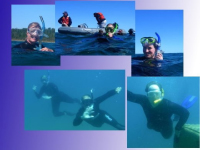The web pages in the "about" section of our website really tell the public story in the words we like best, as well as our goals and workplans. I am particularly fond of the way we link the Great Lakes with the ocean. From my perspective, here's our story:
The first marine and aquatic education research done at Ohio State in 1979 showed that Ohio students knew more about the oceans than about the Great Lakes, and felt more positively about the oceans too! There was actually little public information out there, and no curriculum linkage at all, for information about the Lakes. No wonder there was no knowledge! On the other hand, the salty coasts had their television adventurers, scientists and documentaries spreading the word about the oceans.
Since that time the Sea Grant educators have worked in the eight separate Great Lakes states to develop education programs about the North Coast, but COSEE gives us a chance to work collectively for the entire region. We are so enthusiastic about sharing the wonders and science of the Lakes! And about spreading the word that salt is not what makes a sea! When we study the lakes, we study all the ocean sciences with the same tools and theories and training.
Our territory spans 7°30' of latitude and nearly 16° of longitude, and our shoreline is longer than the Atlantic Coast! Our area is home to one quarter of the US population, and includes eight states, two countries and the First Nations tribes. We also have a staff of experienced and congenial partners in Sea Grant education in our states and in our NOAA lab, the Great Lakes Environmental Research Laboratory. When we developed our proposal, we focused on things we knew we could do well, and determined how to enlarge them for wider service and specific ocean relevance.
 | |
|
Our goals, like all COSEEs, relate to enhancing marine and aquatic literacy through connecting educators, students and the public more directly with the science of the lakes. We want our scientists to be better equipped to reach out to schools and the public with their important messages. We want our teachers and informal educators to know about the high quality curriculum materials available to teach about the Lakes, and to relate them to the oceans. We have the additional goal of increasing access to science among the Native Americans of the region and the many minority groups throughout the large urban areas and rural parts of our area.
In the days before COSEE, our collective experience leaned toward teacher education and curriculum development, so our Center's focus is that kind of contribution, now with more regional and oceanic emphases than was previously possible. Because we are within Sea Grant institutions, we have immediate and collegial access to science researchers, and are networked into the science reporting outlets. Bringing more scientists into contact with educators, and running a School for Scientists to help them reach out, is an exciting part of what we do in COSEE Great Lakes!
We knew we couldn't do everything at once, so we built our primary activities along a geographic line that you'd take if you paddled to the sea. There's a children's book about that idea and we base our work on a flow, like the little carved canoe did. We deal with progressions: from freshwater to salt, from watershed to sea; and with progress: from historical water quality issues to current challenges; from traditional science methods to GLOS technology; from fragmented management to an ecosystem approach.
This translates into how our programs developed. Our big Lake Exploration Workshop began with Lake Superior in 2006, then moved to Lake Huron in '07.
For teachers (grades 4-10) to learn more science and interact closely with scientists there are:
weeklong (land-based) workshops every summer to focus on one lake;
weeklong shipboard and shoreline workshops every summer, aboard the USEPA R/V Lake Guardian, on a different lake than the land workshop;
online workshops with the College of Exploration, 1-2 weeks per year on different science topics. (We had 400 participants for the first offering!);
Marine Immersion scholarships for 20 regional teachers to attend summer programs offered by others (including an exchange with COSEE Southeast);
Teachable Moment one-day workshops offered in each Lake basin, two per year per lake.
For students to have direct science experiences: O'LAKERS grants to schools and education providers, every year, every state (Ocean/Lake-Aware Kids Engaged in Relevant Science); and for online learning we are developing a high school course on Great Lakes Ecology.
For scientists to learn about education outreach, in addition to the workshops: Educators House Calls (in which five teachers spend a day with five scientists, learning science and teaching about their education needs). We had three House Calls in 2006-7 and three in 2008-9, in different states; School for Scientists symposium at the main science meeting in the region in 2007 and 2009. (Presentations are posted for use at other times online.)
Curriculum: managed by one state, but input by all. We compiled Greatest of the Great Lakes CD as a start, and we now are adding saltwater components to make Fresh and Salt Curriculum for distribution Network-wide. We will be using GLOS (Great Lakes Observing System) as it develops, and we plan a curriculum and workshop focus for that in coming years.
Contributed by Rosanne Fortner

